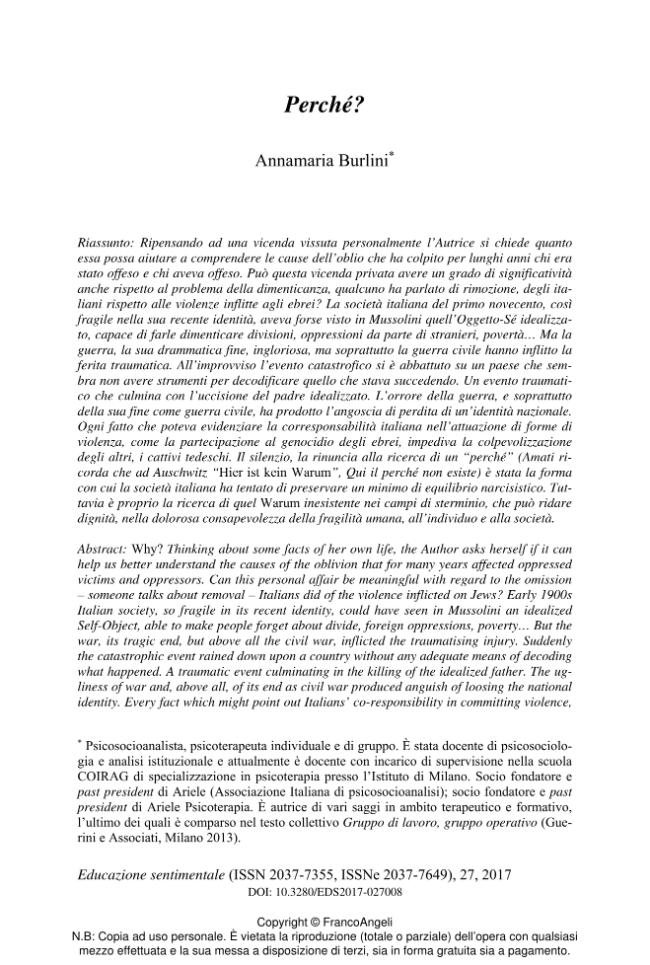Perché?
112-117 p.
Ripensando ad una vicenda vissuta personalmente l'Autrice si chiede quanto essa possa aiutare a comprendere le cause dell'oblio che ha colpito per lunghi anni chi era stato offeso e chi aveva offeso. Può questa vicenda privata avere un grado di significatività anche rispetto al problema della dimenticanza, qualcuno ha parlato di rimozione, degli italiani rispetto alle violenze inflitte agli ebrei? La società italiana del primo novecento, così fragile nella sua recente identità, aveva forse visto in Mussolini quell'Oggetto-Sé idealizzato, capace di farle dimenticare divisioni, oppressioni da parte di stranieri, povertà. Ma la guerra, la sua drammatica fine, ingloriosa, ma soprattutto la guerra civile hanno inflitto la ferita traumatica. All'improvviso l'evento catastrofico si è abbattuto su un paese che sembra non avere strumenti per decodificare quello che stava succedendo.
Un evento traumatico che culmina con l'uccisione del padre idealizzato. L'orrore della guerra, e soprattutto della sua fine come guerra civile, ha prodotto l'angoscia di perdita di un'identità nazionale. Ogni fatto che poteva evidenziare la corresponsabilità italiana nell'attuazione di forme di violenza, come la partecipazione al genocidio degli ebrei, impediva la colpevolizzazione degli altri, i cattivi tedeschi. Il silenzio, la rinuncia alla ricerca di un "perché" (Amati ricorda che ad Auschwitz "Hier ist kein Warum", Qui il perché non esiste) è stata la forma con cui la società italiana ha tentato di preservare un minimo di equilibrio narcisistico. Tuttavia è proprio la ricerca di quel Warum inesistente nei campi di sterminio, che può ridare dignità, nella dolorosa consapevolezza della fragilità umana, all'individuo e alla società. [Testo dell'editore].
Why? Thinking about some facts of her own life, the Author asks herself if it can help us better understand the causes of the oblivion that for many years affected oppressed victims and oppressors. Can this personal affair be meaningful with regard to the omission - someone talks about removal - Italians did of the violence inflicted on Jews? Early 1900s Italian society, so fragile in its recent identity, could have seen in Mussolini an idealized Self-Object, able to make people forget about divide, foreign oppressions, poverty. But the war, its tragic end, but above all the civil war, inflicted the traumatising injury. Suddenly the catastrophic event rained down upon a country without any adequate means of decoding what happened. A traumatic event culminating in the killing of the idealized father.
The ugliness of war and, above all, of its end as civil war produced anguish of loosing the national identity. Every fact which might point out Italians' co-responsibility in committing violence, as participation to the genocide of the Jews, avoided the blame of the others, the evil Germans. The silence, the surrender of the search for a "why" (Amati remembers that in Auschwitz "Hier ist kein Warum", Here there is no why) was the way the Italian society tried to maintain a minimum of narcissistic balance. However the research of that Warum non-existent in death camps is precisely what can return dignity, in the painful knowledge of the human fragility, to individuals and society. [Publisher's Text].
Forma parte de
Educazione sentimentale : 27, 1, 2017-
Artículos del mismo número (disponibles individualmente)
-
Información
Código DOI: 10.3280/EDS2017-027008
MATERIAS
KEYWORDS
- Identità, dis-identità, trauma, catastrofe sociale, arresto del pensiero, patto denegativo
- Identity, dis-identity, trauma, social catastrophe, thought arrest, denial pact



